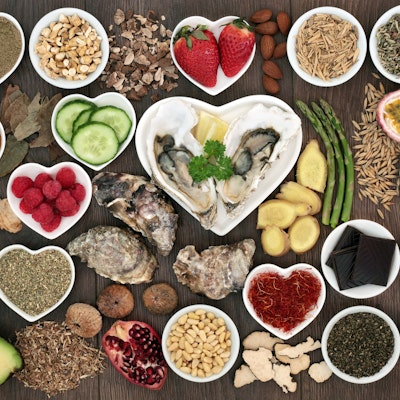Victoria's Allergen Diary Part 6: Friends, Family & Relationships

Welcome to The Allergen Diaries, in which we explore first-hand the challenges and problems faced by severe allergy sufferers as consumers in the foodservice industry.
You’ll know that Erudus’s very own Victoria McEwan is our current columnist. Victoria suffers from a number of serious allergies, as well as some of the health issues commonly associated with them, and in her previous posts she covered the basics of living with multiple allergies, eating out with allergies, moving away from home as an allergy sufferer, and how her allergies affect both people like her and those who work in the hospitality industry. Last time in Part 5 she explored the dangers of travelling with allergies as we look towards a time when foreign holidays are back on the agenda.
For her final installment, Victoria wants to talk about an aspect of suffering from allergies that is sometimes overlooked - the impact it has on friends and family, and how good communication on the subject can benefit everyone.
Over to Victoria...
“Communicating and informing people about your allergy (or allergies) is absolutely essential - especially to those close to you. As [allergy-related] hospital admissions increase, research shows that younger people are at higher risk of experiencing allergic reactions, with only 56% of young people with food allergies telling others when eating out, and individuals aged 16-24 often keeping allergies under wraps out of embarrassment.*
Before I went off to university I had never experienced a severe allergic reaction that I can remember. But why? I think once you break away from the shelter of home and the security of your family, as well as generally getting caught up in how to navigate the numerous other areas of life, it becomes harder to manage your allergies. They can come with a lot of anxiety, awkwardness and embarrassment. Who wants to be the person feeling like they’re ruining a dinner or making bookings stressful because of the things they have to eat? No one.
But it’s something that you learn to navigate and you have to manage it. Whilst eating establishments do hold a certain amount of responsibility, it is also the responsibility of the individual with an allergy (which I discuss in Part 4 of this series).
The Food Standards Agency’s new ‘Speak Up For Allergies’ campaign is incredibly important, as it shows how crucial it is to highlight your allergy to food businesses, even if you have eaten there before. As we all know, ingredients can change. Life is so much easier when family, friends, partners, your school, your university, any place or person that you interact with, knows about your allergies, and understands them.
So here are some tips on helping you communicate to those around you...
Family
Your immediate family are the first people who can help you with your allergies, as when you’re growing up they’re most likely to be dealing with them first hand - especially if you have allergies from a young age. They need to know exactly what you’re allergic to, how to deal with your allergies and signs of reactions.
Whilst our immediate family are often our saving grace and make situations much more comfortable for us, at social events with wider family you will have to educate. Family BBQs, birthday parties, weddings and garden parties can be a minefield for allergens, so it’s important to talk to whoever’s in charge of the food and explain your allergies.
Tell them what you’re allergic to, how it will affect you, and ask them what they’re planning on cooking. By going through everything together you can point out what you can and can’t eat, any potential swaps that are easy to make that will make dishes allergy-friendly, and whoever’s cooking can ensure that your food is kept separate so there are no risks of cross-contamination.

Friends
26% of allergy sufferers only tell people about their allergies when they get to know them better.* Sometimes it can feel scary bringing up allergies as soon as you meet people, but it shouldn’t be! My advice is to make the situation lighthearted. So much has happened to me because of my allergies, and when I meet people, telling stories about my allergies can actually be a big ice breaker and it gets people asking questions. Mostly they’re actually interested, curious and want to learn more about them. That’s the perfect opportunity to let them know about the symptoms and what to do if someone has an allergic reaction.
I’ve found that telling friends is so important. When my housemates ring up places to book meals, because they know about my allergy they can ask about it when calling the restaurant to check that there’ll be food suitable and safe for me to eat, which is so nice because it takes the pressure of me dealing with it every time we eat out and and helps me feel less alone in my condition. When cooking, my friends are always double checking ingredients, cleaning and making sure of no cross-contamination which I appreciate so much. So really, it’s not awkward bringing up your allergies at all - it actually makes life so much better.
What are the symptoms of an allergic reaction:
Mild:
- Sneezing
- Itching
- Wheezing, chest tightness, shortness of breath, coughing
- Raised, Itchy Red Rash, Hives
- Swelling of the lips, tongue, eyes or face
- Tummy pain, feeling sick, vomiting, diarrhoea,
- Dry, red and cracked skin
Severe (Anaphylaxis), the symptoms above as well as:
- Swelling of the throat and mouth
- Difficulty breathing
- Lightheadedness
- Confusion
- Blue Skin/Lips
- Collapsing and losing consciousness

Dating & Relationships
Dating with allergies is very interesting, and from personal experience, and also what I’ve read of other people’s experiences, people can be very cruel. Jenna Schreck wrote about dating with allergies in Cosmopolitan and mentioned that an ex-boyfriend told her ‘you will never find someone who will be able to put up with your food allergies and health stuff better than I have’ and I’ve had similarly insulting remarks about my allergies and illnesses that come with it, such as asthma and eczema.
I was told that ‘if we ever have kids I hope they don’t have your allergies or your skin’, among other things. I felt horrible. Now I see both sides to this - of course everyone wants their child to be healthy and have nothing wrong with them, but to me it was a huge insult and those words made me feel awful about myself, as if these things that I have to deal with on a daily basis make me less desirable and not good enough. It really affected my confidence. Safe to say things didn’t work out with him!
I’m now in a relationship where not only do I feel so happy with every part of myself; eczema, asthma and allergies included, but that person goes the extra mile to make sure I feel safe, whenever we go out to eat, when booking places to eat, when buying ingredients to do the cooking, buying me gluten-free/nut-free treats and watching what he eats. It’s so important to be with someone thoughtful and understanding, otherwise they’re not worth it, so don’t settle for anything less than someone caring and compassionate! The right person will listen,learn and be genuinely interested about your allergies.
Here are my general tips to help you navigate dating and relationships:
- Bring your allergies up, it’s a talking point and nothing to be embarrassed of and it makes things a whole lot easier when that conversation is out of the way. Once you know what to look out for you can find places where you can both enjoy the food and you feel comfortable eating at.
- If the date has gone really well, and you think a kiss might be on the cards, make sure you’ve asked your date if they’ve eaten anything you're allergic to. You don’t want a perfect date to end with a trip to A&E! Allergens can stay in saliva for up to 4 hours, and sometimes even longer so please check. This goes for relationships as well, always check what your partner has eaten that day before you kiss.
- Create a recipe book of favourite meals that are allergy friendly so you can cook dinner together.
- Ring the restaurant beforehand, let them know about your allergies about whether they can accommodate you.
- Establish a plan with your date so that they know what to do in the event of an emergency.
- Educating people about allergies requires patience, some people may never have had to deal with allergies and they’re not clued up on them, so it’s important to be understanding.
Finally...
As an allergy sufferer, and a consumer who wants to know exactly what is in the food they’re eating, learning about Erudus, and knowing that so many Manufacturers and Wholesalers use it to communicate important allergen and nutritional information to Caterers really puts me at ease and gives me peace of mind. It means they’re able to tell me exactly what allergens are (and could be) present in my food. It is exactly what the food industry needs - having industry-wide access to an instant, single source of data truth can prevent so many fatal incidents and gives the consumer at the end of the chain options, and the power and knowledge to make sensible decisions.”
*https://uniform.net/media/3362/canvas8-how-do-food-brands-help-people-to-manage-allergies.pdf



